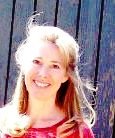Page Lambert was married for 25 years when she faced leaving her marriage and the Wyoming ranch she loved so dearly. While the decision to dig up her roots and move wasn’t entirely of her own making, Page sees the time she spent helping her mother transition from this life as probably the most important aspect of her life in the last five years.
***

I think probably what has been most significant for me since my divorce is being my mother’s primary caregiver when she was at home as a hospice patient for two years. It came on the heel of leaving my marriage and leaving the ranch and was huge because I arrived really with no emotional reserves to speak of. It was very intensive and difficult and bittersweet and wonderful – all those emotions wrapped together.
When I originally left the ranch, I moved to a small cottage in town so I was close to the ranch and could still hike there. When I decided to move to Colorado to take care of mom, I’m not sure I was truly ready to leave my community. As a writer and writing about the experiences on the ranch, it was much like a potter deciding to give up his clay.
It was very, very difficult to leave. I think when women divorce they are leaving more than just the marriage. There are a lot of dynamics at work. It’s also much different for a woman and a mother when they leave the nest versus when the husband leaves, especially if the marriage was fairly traditional, which mine was. I had much sorrow, a lot of adjustment and transition to deal with besides losing the marriage.
At the same time, my mother had struggled with cancer for many, many years and I knew it was time. She needed me with her full-time. I love the community she lived in – I grew up here as a little girl in the 50’s. It’s a wonderful mountain community above Golden so that did make the decision easier to make. Thousands of acres of open space and natural habitat surround me so at least I had some hiking trails and some of the nature I was used to on the ranch even though I didn’t have any animals.
It was a blessing to her because it meant she could stay at home that entire time. In some ways, even though I hadn’t intended to move from Wyoming that quickly, it was also a nice transition for me in terms of having a home to go. I was needed and I had family around me.
I did become more intimately acquainted with death and the process of dying than I had been. Even though there is death on a ranch, you see life being regenerated. You don’t have that when you’re losing your mother and when it’s a prolonged kind of dying process. I watched my mother transition from spending so much time and energy trying to keep herself physically healthy and nutritionally fit enough to fight cancer, to accepting that she couldn’t feed her body anymore and that she was feeding her soul.
One of the most amazing discoveries I think I learned was what a community of support I had in regards to my mother. The community of neighbors that mom had up there made this transition for her such a rewarding one. I got to know these neighbors much more intimately. The relationship transitioned from being one where I was their friend’s daughter to one where we are now friends. That was a lovely rich part of the whole experience.
***
After her mother’s passing, Page bought her mother’s property and now feels deeply rooted in the community there. Come back and visit tomorrow to read how Page reconnected with nature and now sees herself as a citizen of the West.
Page Lambert is a writer with a gift for nature and the western landscape. She mentors people who want to creatively connect more deeply with the natural world. Page facilitates outdoor creative adventures and in 2006, Oprah’s O Magazine featured Page’s ‘River Writing Journeys for Women’ as one of the top six great all-girl getaways of the year.
Page shared a story, “These things I can love” in a guest post recently. It’s an extract from a narrative non-fiction she’s working. You can read more about Page and her work at her website and at her blog.